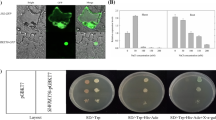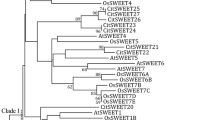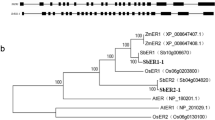Abstract
Key message
Forty PaCRKs have been identified from sweet cherry and overexpression PaCRK1 in sweet cherry enhances its resistance to salt stress.
Abstract
Cysteine-rich receptor-like kinases (CRKs), a large subgroup of the receptor-like kinases, play an important role in plant development and stress response. However, knowledge about CRKs and its function against adverse environmental stresses in sweet cherry were lacking. In this study, 40 PaCRKs were identified from sweet cherry (Prunus avium) genome database. Phylogenetic analysis indicated that PaCRKs could be classified into six subgroups. Transcriptome analysis showed that the expression levels of most PaCRKs were changed under external environmental stresses. Functional study showed that PaCRK1 overexpression could enhance Arabidopsis and sweet cherry tolerance to salt stress. Moreover, biochemical analysis showed that PaCRK1 increased salt tolerance of sweet cherry by regulating the expression of antioxidation-related genes and their enzyme activities. This study provides a comprehensive understanding of PaCRKs in sweet cherry and elucidates the potential role of PaCRKs in response to various environmental stimuli.








Similar content being viewed by others
Data availability
The RNA-Seq data has been deposited to the SRA of NCBI (https://www.ncbi.nlm.nih.gov/biosample) with the data set Submission ID SUB11195318 and BioProject ID PRJNA816669.
References
Acharya BR, Raina S, Maqbool SB, Jagadeeswaran G, Mosher SL, Appel HM, Schultz JC, Klessig DF, Raina R (2007) Overexpression of CRK13, an Arabidopsis cysteine-rich receptor-like kinase, results in enhanced resistance to Pseudomonas syringae. Plant J 50(3):488–499. https://doi.org/10.1111/j.1365-313X.2007.03064.x
Bassil E, Tajima H, Liang Y-C, Ohto M-a, Ushijima K, Nakano R, Esumi T, Coku A, Belmonte M, Blumwald E (2011) The Arabidopsis Na+/H+ antiporters NHX1 and NHX2 control vacuolar pH and K+ homeostasis to regulate growth, flower development, and reproduction. Plant Cell 23(9):3482–3497. https://doi.org/10.1105/tpc.111.089581
Brew-Appiah RA-O, York ZB, Krishnan V, Roalson EH, Sanguinet KA (2018) Genome-wide identification and analysis of the ALTERNATIVE OXIDASE gene family in diploid and hexaploid wheat. PLoS ONE 13(8):e0201439. https://doi.org/10.1371/journal.pone.0201439
Burdiak P, Rusaczonek A, Witoń D, Głów D, Karpiński S (2015) Cysteine-rich receptor-like kinase CRK5 as a regulator of growth, development, and ultraviolet radiation responses in Arabidopsis thaliana. J Exp Bot 66(11):3325–3337. https://doi.org/10.1093/jxb/erv143
Calzone A, Cotrozzi L, Pellegrini E, Lorenzini G, Nali C, Maathuis F (2021) Can the transcriptional regulation of NHX1, SOS1 and HKT1 genes handle the response of two pomegranate cultivars to moderate salt stress? Sci Hortic 288:110309. https://doi.org/10.1016/j.scienta.2021.110309
Chen K, Du L, Chen Z (2003) Sensitization of defense responses and activation of programmed cell death by a pathogen-induced receptor-like protein kinase in Arabidopsis. Plant Mol Biol 53(1):61–74. https://doi.org/10.1023/B:PLAN.0000009265.72567.58
Chen XR, Li YP, Li QY, Xing YP, Liu BB, Tong YH, Xu JY (2016) SCR96, a small cysteine-rich secretory protein of phytophthora cactorum, can trigger cell death in the Solanaceae and is important for pathogenicity and oxidative stress tolerance. Mol Plant Pathol 17(4):577–587. https://doi.org/10.1111/mpp.12303
Chern M, Xu Q, Bart RS, Bai W, Ruan D, Sze-To WH, Canlas PE, Jain R, Chen X, Ronald PC (2016) A genetic screen identifies a requirement for cysteine-rich-receptor-like kinases in Rice NH1 (OsNPR1)-mediated immunity. PLoS Genet 12(5):e1006049. https://doi.org/10.1371/journal.pgen.1006049
Clemensson-Lindell A (1994) Triphenyltetrazolium chloride as an indicator of fine-root vitality and environmental stress in coniferous forest stands: applications and limitations. Plant Soil 159(2):297–300. https://doi.org/10.1007/BF00009293
Cruz de Carvalho MH (2008) Drought stress and reactive oxygen species. Plant Signal Behav 3(3):156–165. https://doi.org/10.4161/psb.3.3.5536
Das K, Roychoudhury A (2014) Reactive oxygen species (ROS) and response of antioxidants as ROS-scavengers during environmental stress in plants. Front Environ Sci. https://doi.org/10.3389/fenvs.2014.00053
Delgado-Cerrone L, Alvarez A, Mena EA-O, Ponce de León IA-O, Montesano MA-O (2018) Genome-wide analysis of the soybean CRK-family and transcriptional regulation by biotic stress signals triggering plant immunity. PLoS ONE 13(11):e0207438. https://doi.org/10.1371/journal.pone.0207438
Ederli L, Madeo L, Calderini O, Gehring C, Moretti C, Buonaurio R, Paolocci F, Pasqualini S (2011) The Arabidopsis thaliana cysteine-rich receptor-like kinase CRK20 modulates host responses to Pseudomonas syringae pv. tomato DC3000 infection. J Plant Physiol 168(15):1784–1794. https://doi.org/10.1016/j.jplph.2011.05.018
García-Sánchez F, Simón-Grao S, Martínez-Nicolás JJ, Alfosea-Simón M, Liu C, Chatzissavvidis C, Pérez-Pérez JG, Cámara-Zapata JM (2020) Multiple stresses occurring with boron toxicity and deficiency in plants. J Hazard Mater 397:122713. https://doi.org/10.1016/j.jhazmat.2020.122713
Havir EA, McHale NA (1987) Biochemical and developmental characterization of multiple forms of catalase in tobacco leaves. Plant Physiol 84(2):450–455. https://doi.org/10.1104/pp.84.2.450
Hunter K, Kimura S, Rokka A, Tran HC, Toyota M, Kukkonen JP, Wrzaczek M (2019) CRK2 enhances salt tolerance by regulating callose deposition in connection with PLDα1. Plant Physiol 180(4):2004–2021. https://doi.org/10.1104/pp.19.00560
Idänheimo N, Gauthier A, Salojärvi J, Siligato R, Brosché M, Kollist H, Mähönen AP, Kangasjärvi J, Wrzaczek M (2014) The Arabidopsis thaliana cysteine-rich receptor-like kinases CRK6 and CRK7 protect against apoplastic oxidative stress. Biochem Biophys Res Commun 445(2):457–462. https://doi.org/10.1016/j.bbrc.2014.02.013
Jamieson PA, Shan L, He P (2018) Plant cell surface molecular cypher: receptor-like proteins and their roles in immunity and development. Plant Sci 274:242–251. https://doi.org/10.1016/j.plantsci.2018.05.030
Kiraga J, Mackiewicz P, Mackiewicz D, Kowalczuk M, Biecek P, Polak N, Smolarczyk K, Dudek MR, Cebrat S (2007) The relationships between the isoelectric point and: length of proteins, taxonomy and ecology of organisms. BMC Genom 8(1):163. https://doi.org/10.1186/1471-2164-8-163
Lager IDA, AndrÉAsson OLA, Dunbar TL, Andreasson E, Escobar MA, Rasmusson AG (2010) Changes in external pH rapidly alter plant gene expression and modulate auxin and elicitor responses. Plant Cell Environ 33(9):1513–1528. https://doi.org/10.1111/j.1365-3040.2010.02161.x
Lee DS, Kim YC, Kwon SJ, Ryu CM, Park OK (2017) The Arabidopsis cysteine-rich receptor-like kinase CRK36 regulates immunity through interaction with the cytoplasmic kinase BIK1. Front Plant Sci 8:1856. https://doi.org/10.3389/fpls.2017.01856
Li T-G, Zhang D-D, Zhou L, Kong Z-Q, Hussaini AS, Wang D, Li J-J, Short DPG, Dhar N, Klosterman SJ, Wang B-L, Yin C-M, Subbarao KV, Chen J-Y, Dai X-F (2018) Genome-wide identification and functional analyses of the CRK gene family in cotton reveals GbCRK18 confers verticillium wilt resistance in gossypium barbadense. Front Plant Sci 9:1266. https://doi.org/10.3389/fpls.2018.01266
Lu K, Liang S, Wu Z, Bi C, Yu Y-T, Wang X-F, Zhang D-P (2016) Overexpression of an Arabidopsis cysteine-rich receptor-like protein kinase, CRK5, enhances abscisic acid sensitivity and confers drought tolerance. J Exp Bot 67(17):5009–5027. https://doi.org/10.1093/jxb/erw266
Nakano Y, Asada K (1981) Hydrogen peroxide is scavenged by ascorbate-specific peroxidase in spinach chloroplasts. Plant Cell Physiol 22(5):867–880. https://doi.org/10.1007/BF00391422
Quezada EA-O, García GX, Arthikala MK, Melappa GA-O, Lara M, Nanjareddy K (2019) Cysteine-rich receptor-like kinase gene family identification in the phaseolus genome and comparative analysis of their expression profiles specific to mycorrhizal and rhizobial symbiosis. Genes (basel) 10(1):59. https://doi.org/10.3390/genes10010059
Serra TS, Figueiredo DD, Cordeiro AM, Almeida DM, Lourenço T, Abreu IA, Sebastián A, Fernandes L, Contreras-Moreira B, Oliveira MM, Saibo NJM (2013) OsRMC, a negative regulator of salt stress response in rice, is regulated by two AP2/ERF transcription factors. Plant Mol Biol 82(4):439–455. https://doi.org/10.1007/s11103-013-0073-9
Shiu S-H, Bleecker AB (2001) Receptor-like kinases from Arabidopsis form a monophyletic gene family related to animal receptor kinases. Proc Natl Acad Sci USA 98(19):10763. https://doi.org/10.1073/pnas.181141598
Sun Y, Zhao X, Gao Y, Jiao J, Sun Y, Zhu D, Yang J, Wu F, Su H (2022) Genome-wide analysis of lectin receptor-like kinases (LecRLKs) in sweet cherry (Prunus avium) and reveals PaLectinL16 enhances sweet cherry resistance with salt stress. Environ Exp Bot 194:104751. https://doi.org/10.1016/j.envexpbot.2021.104751
Uno Y, Furihata T, Abe H, Yoshida R, Shinozaki K, Yamaguchi-Shinozaki K (2000) Arabidopsis basic leucine zipper transcription factors involved in an abscisic acid-dependent signal transduction pathway under drought and high-salinity conditions. Proc Natl Acad Sci USA 97(21):11632–11637. https://doi.org/10.1073/pnas.190309197
Wang J, Liu W, Zhu D, Hong P, Zhang S, Xiao S, Tan Y, Chen X, Xu L, Zong X, Zhang L, Wei H, Yuan X, Liu Q (2020) Chromosome-scale genome assembly of sweet cherry (Prunus avium L.) cv. Tieton obtained using long-read and Hi-C sequencing. Horticult Res 7(1):122. https://doi.org/10.1038/s41438-020-00343-8
Wrzaczek M, Brosché M, Salojärvi J, Kangasjärvi S, Idänheimo N, Mersmann S, Robatzek S, Karpiński S, Karpińska B, Kangasjärvi J (2010) Transcriptional regulation of the CRK/DUF26 group of Receptor-like protein kinases by ozone and plant hormones in Arabidopsis. BMC Plant Biol 10(1):95. https://doi.org/10.1186/1471-2229-10-95
Wu Y, Zhou J-M (2013) Receptor-like kinases in plant innate immunity. J Integr Plant Biol 55(12):1271–1286. https://doi.org/10.1111/jipb.12123
Xing Y, Jia W, Zhang J (2007) AtMEK1 mediates stress-induced gene expression of CAT1 catalase by triggering H2O2 production in Arabidopsis. J Exp Bot 58(11):2969–2981. https://doi.org/10.1093/jxb/erm144
Yadeta KA, Elmore JM, Creer AY, Feng B, Franco JY, Rufian JS, He P, Phinney B, Coaker G (2017) A cysteine-rich protein kinase associates with a membrane immune complex and the cysteine residues are required for cell death. Plant Physiol 173(1):771–787. https://doi.org/10.1104/pp.16.01404
Yeh Y-H, Chang Y-H, Huang P-Y, Huang J-B, Zimmerli L (2015) Enhanced Arabidopsis pattern-triggered immunity by overexpression of cysteine-rich receptor-like kinases. Front Plant Sci. https://doi.org/10.3389/fpls.2015.00322
Zhang X, Han X, Shi R, Yang G, Qi L, Wang R, Li G (2013) Arabidopsis cysteine-rich receptor-like kinase 45 positively regulates disease resistance to pseudomonas syringae. Plant Physiol Biochem 73:383–391. https://doi.org/10.1016/j.plaphy.2013.10.024
Zhang Z, Wang J, Jin W, Ge D, Liu K, Le F, Sun J (2018) Identification and expression analysis of CRK gene family in upland cotton. Sci Agric Sin 51(13):2442–2461. https://doi.org/10.3864/j.issn.0578-1752.2018.13.002
Zou JJ, Li XD, Ratnasekera D, Wang C, Liu WX, Song LF, Zhang WZ, Wu WH (2015) Arabidopsis CALCIUM-DEPENDENT PROTEIN KINASE8 and CATALASE3 function in abscisic acid-mediated signaling and H2O2 homeostasis in stomatal guard cells under drought stress. Plant Cell 27(5):1445–1460. https://doi.org/10.1105/tpc.15.00144
Zuo C, Liu H, Lv Q, Chen Z, Tian Y, Mao J, Chu M, Ma Z, An Z, Chen B (2020) Genome-wide analysis of the Apple (Malus domestica) cysteine-rich receptor-like kinase (CRK) family: annotation, genomic organization, and expression profiles in response to fungal infection. Plant Mol Biol Report 38(1):14–24. https://doi.org/10.1007/s11105-019-01179-w
Acknowledgements
This study was supported by the Improved Seed Project of Shandong Province (2020LZGC008), the National Natural Science Foundation of China (32071788 and 32171810), the Natural Science Foundation of Shandong Province (ZR2021MC102, ZR2020MC153 and ZR2020MC135).
Author information
Authors and Affiliations
Corresponding authors
Ethics declarations
Conflict of interest
The authors declare that they have no conflict of interest.
Additional information
Communicated by Jinghua Yang.
Publisher's Note
Springer Nature remains neutral with regard to jurisdictional claims in published maps and institutional affiliations.
Supplementary Information
Below is the link to the electronic supplementary material.
Rights and permissions
Springer Nature or its licensor holds exclusive rights to this article under a publishing agreement with the author(s) or other rightsholder(s); author self-archiving of the accepted manuscript version of this article is solely governed by the terms of such publishing agreement and applicable law.
About this article
Cite this article
Zhao, X., Qu, D., Wang, L. et al. Genome-wide identification of cysteine-rich receptor-like kinases in sweet cherry reveals that PaCRK1 enhances sweet cherry resistance to salt stress. Plant Cell Rep 41, 2037–2088 (2022). https://doi.org/10.1007/s00299-022-02907-5
Received:
Accepted:
Published:
Issue Date:
DOI: https://doi.org/10.1007/s00299-022-02907-5




